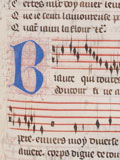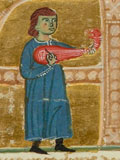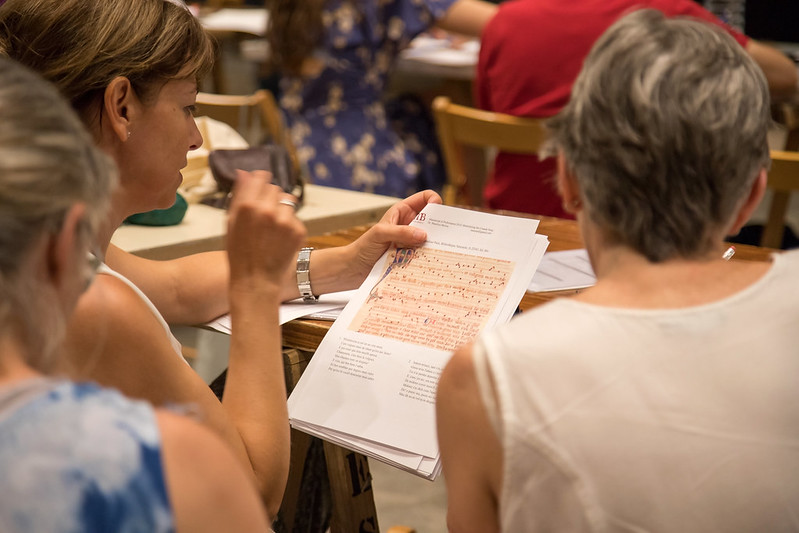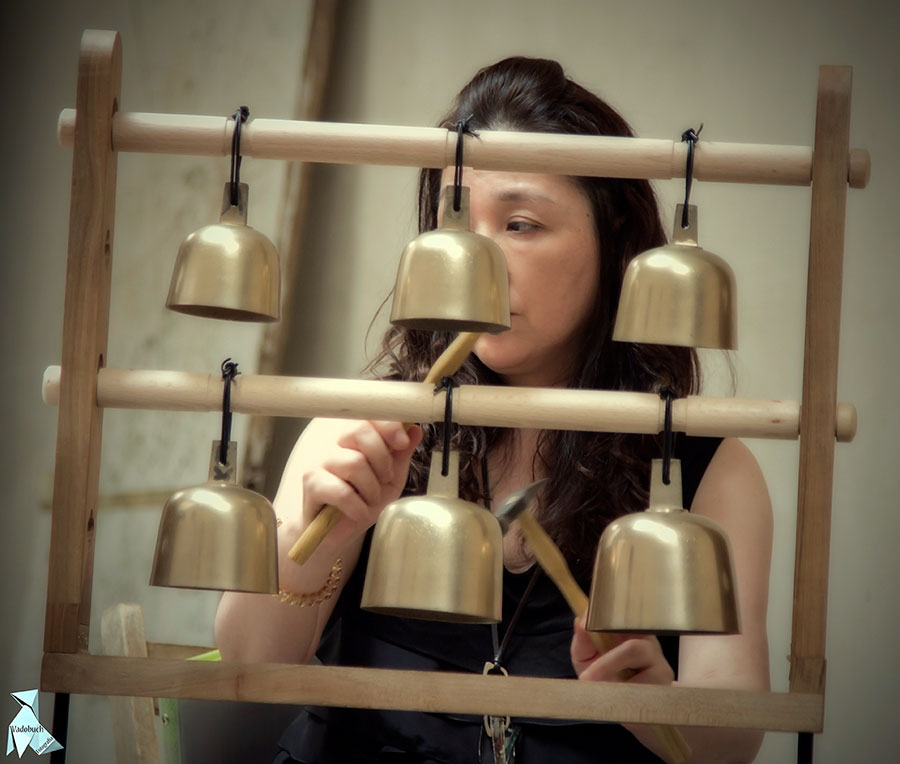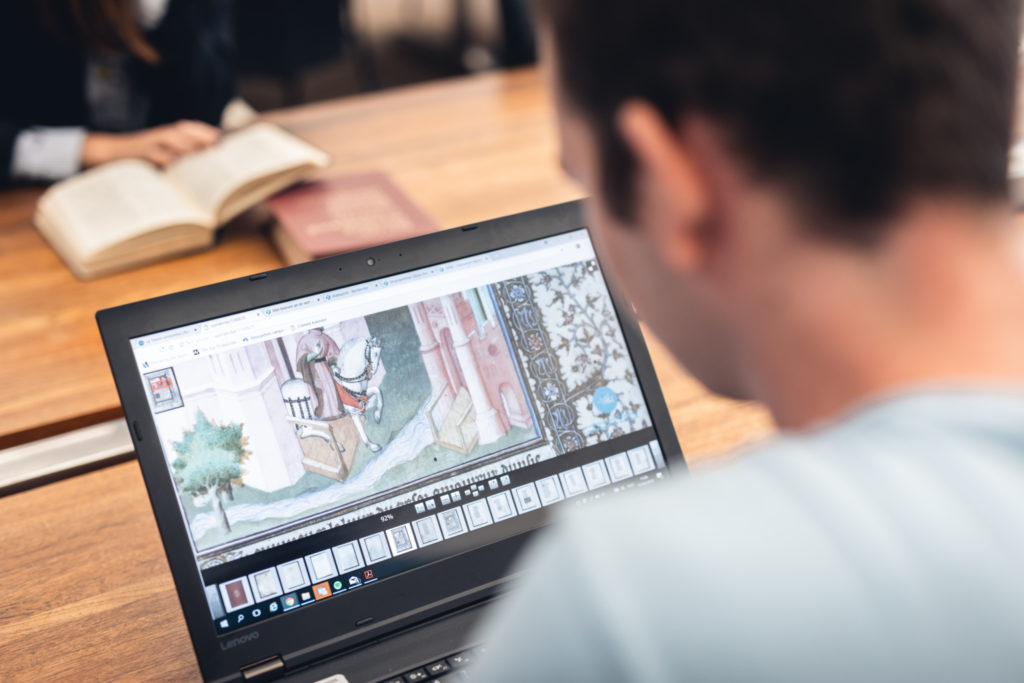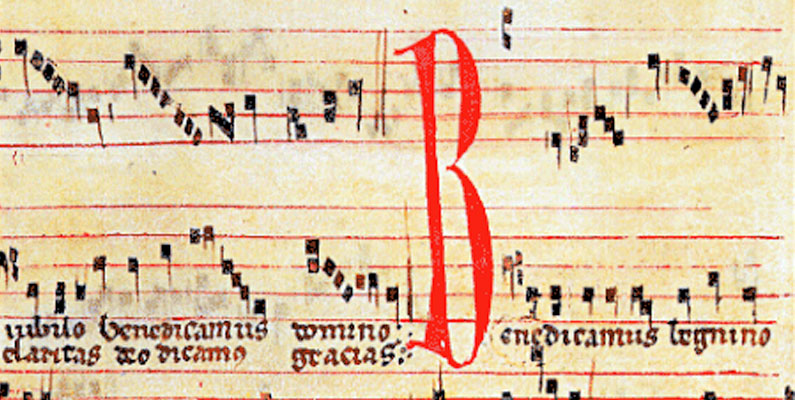UPCOMING ONLINE COURSES
Fall 2025 Online
Study medieval music history, notations, genres, repertoires, sources, performance practice, research techniques, musical iconography, singing, and musical instruments techniques and practices.
Starts September,15 2025
Medieval Notation
Modal Notation
Modal notation is the key to the music of the School of Notre Dame. Explore this notation through the study of treaties, music manuscripts, and genres. Learn to transcribe it and sight read it directly from the original sources.
Mensural and Franconian Notations
Learn to read Mensural and Franconian notations directly from the original sources following the instructions given by Franco of Cologne and other medieval writers. These notations give access to the monophonic and polyphonic repertoires of the 13th and 14th centuries.
The Earliest Medieval Music Notations (850-1200)
Learn to identify, decipher, and read the neumatic, alphabetic, and staff musical notations used before the development of modal notation. Explore the monophonic and polyphonic repertoires recorded by these notations.
Ars nova Notation
Learn to read 14th-century notation directly from the original sources following the instructions given by medieval theorists. This opens the door to the music of Guillaume de Machaut and his contemporaries.
Medieval Music History
Medieval Music History and Performance I (800-1150)
Study the composition, notations, musical and poetic frameworks, genres, performance practices, and social/cultural contexts of the central repertoires composed between 800 and 1150.
Medieval Music History and Performance II (1150-1300)
Explore Western European monophonic and polyphonic religious and secular music composed between 1150 and 1300. Learn about its principal sources, repertoires, notations, compositional techniques, and performance practices.
Performance Practice and Repertoires
The Cantigas of Santa Maria of Alfonso X: Context, Notation, Performance
Learn about the sources, music notation, poetic and melodic composition, and context of the Cantigas de Santa Maria. Explore their possible performance practice following medieval conventions and musicological theories.
The Trouvère Chanson and its Performance
Examine the principal composers and musical sources of the trouvère chanson. Learn about its main poetic-musical structures, genres, historical/cultural context, and performance practice.
The Monophonic Music of Medieval Paris
Explore and learn to perform the vibrant monophonic repertoires of medieval Paris: the conductus, trouvère chanson, The Miracles of Notre Dame of Gautier de Coinci, the Roman de Fauvel, and the Estampies royales.
The Art of the Troubadour Song
Explore the troubadour song repertoire through an in-depth practical study of its composers, sources, music notations, genres, social/historical context, and performance practice (from primary and secondary sources).
Melodic Ornamentation
Learn how to ornament a medieval vocal or instrumental melody by following the ornamentation procedures recorded in medieval sources: pitch inflection, repercussive and tremulous sounds, passing and neighboring tones, and pitch transposition.
Melodic Improvisation (Vocal and Instrumental)
Learn how to improvise vocal and instrumental melodies in different medieval styles following medieval musical and rhetorical compositional techniques, melodic modal practice, and performance conventions.
The Estampies and Danses Royales of the Manuscript du Roi
Study the composition, notation, context, and possible performance practice of the eleven instrumental pieces contained in the Manuscrit du Roi. Create your own performance edition of the whole collection.
Applied Musicology and Performance
Research Techniques and Applied Musicology
Explore a collection of research techniques and musicological approaches that can be utilized to conduct in-depth research on medieval sources. Learn to construct solid historically-informed theories about medieval music and its performance.
Medieval Musical Iconography
Learn to utilize musical subjects depicted in medieval art as sources of information about medieval music’s aesthetics, performers, audiences, physical environments, contexts, musical instruments, performers, and performance practices.
Voice & Musical Instruments in Context
These courses will help you develop historically-informed vocal or instrumental playing techniques, realize and use appropriate medieval performance conventions, and build a relevant performance repertoire.
Medieval Singing
Medieval Singing I: Carmina Burana - An Entry into Medieval Monophonic Song
The Carmina Burana manuscript covers almost every imaginable subject and a variety of musical and poetic genres. For this reason, it is an ideal starting point for any singer wishing to enter the world of medieval monophonic song.
Medieval Singing II: Hildegard von Bingen - The Voice of Divine Inspiration
Learn about Hildegard’s life and her cultural environment, and perform several pieces from her Symphonia armonie celestium revelationum. This course will give you the tools to sing Hildegard’s songs and make your own decisions about performing her compositions.
Medieval Singing III: Dit du chancelier Philippe - A Story of Notre Dame’s most Glorious Chancellor
Study Philippe le Chancelier’s songs while developing an advanced vocal technique while acquiring practical tools for the understanding and performance of any medieval song repertoire.
Frame Drums & Percussion
Frame Drums I: Basic Technique and Repertoires
Learn to play round and square frame drums in medieval style by studying strokes and techniques recorded in medieval sources. You will also discover how to apply medieval rhythmic modes and their ornamentation to the accompany of vocal and instrumental pieces.
Frame Drums II: Rhythmic Accompaniment, Ornamentation, and Improvisation
Learn to accompany songs and to improvise applying different hand, finger, and wrist techniques. Relative medieval Arabic rhythms will be studied and their possible application in medieval European repertoires will be discussed.
Frame Drums III: Accompanying Dance and Women’s Song Repertoires
Explore the performance of frame drums in connection with different dance and women’s song repertoires.
Vielle
Vielle I: Basic Technique, Repertoires and Performance Practice
Develop your vielle playing technique as you work with medieval tunings, improvise preludes and postludes, and perform different northern French repertoires: trouvère and clerical lyrical songs, dance pieces, and instrumental repertoires.
Vielle II: Performing Trouvère and Parisian Repertoires
Develop your vielle playing technique as you work with medieval tunings, learn how to improvise preludes and postludes, and perform different northern French repertoires: trouvère and clerical lyrical songs, dance pieces, and instrumental repertoires.
Vielle III: The Vielle and Jerome of Moravia
Strengthen your vielle technique while studying the tunings, repertoires, and performance practice precepts (ornamentation, phrasing, rhythm) given by Jerome of Moravia in his Tractatus de music (c. 1280).
Citole/Gittern
Citole/Gittern I: Basic Technique and Repertoire
Study the basic playing techniques of the citole or the gittern as you learn to accompany monophonic songs. Explore and perform repertoires appropriate for these instruments.
Citole/Gittern II: Secular and Religious Dance Songs
Develop different plectrum techniques, study numerous ways to accompany monophonic songs and dances, learn to arrange vocal music for the instrument, and perform pieces from the instrumental repertoire.
Citole/Gittern III: The Citole/Gittern and the Clerical Music Repertoire
Strengthen your citole or psaltery technique and performance practice while exploring a collection of clerical compositions (Latin songs and instrumental pieces) associated to these instruments in medieval literature and art.
Portative Organ
Portative Organ I: Discovering the Portative Organ
Learn the basics of portative organ technique and performance practice while immersing yourself in the world of medieval music and its repertoires.
Portative Organ II: Towards expressivity and flexibility
Expand your repertoire and gain in expressivity and flexibility in your performance practice by developing a strong bellow technique and by learning a variety of articulation practices.
Portative Organ III: The Organ in the Medieval Clerical Universe
Develop a high-level technique (bellows subtle control, precise tuning, expressiveness) as you explore an array of repertoires related to the instrument. Learn about the organ’s function and symbolism in its medieval context.
Harp
Medieval Harp I: Basic Technique and Repertoires
Develop a healthy medieval harp playing technique while you learn about the different types of medieval harps, explore melodic playing and intervallic accompaniment, and perform different medieval music repertoires.
Medieval Harp II: The Harp in 13th-Century France
Continue developing your medieval harp technique, playing style, and improvisation skills (solo or in ensemble) as you explore harp-specific pieces based on French repertoires (trouvères, polyphony, estampies).
Medieval Harp III: The Harp and Anglo-Norman Repertoire
Develop a varied playing style on the medieval harp while exploring the fascinating sounds of the Anglo-Norman repertoire.
Bagpipe/Pipe & Tabor
Bagpipe/Pipe & Tabor: A grant piperie - dance music for wind instruments
Advance your bagpipe (musa) or Pipe and Tabor playing technique while reconstructing a collection of pieces for these instruments based on the pastourelle, dance song, and instrumental music repertoires connected to them in medieval sources.
Enroll Now
Places are limited for each section, so sign up early.
What Our Students Say
The Medieval Music Besalú offers singers and instrumentalists the opportunity to study monophonic and polyphonic music composed between the 11th and 13th centuries.
Can I take courses for university credit without enrolling in the full specialist certificate program?
Yes, courses can be taken for credit individually without having to enroll in the full certificate program. You can transfer the credits later on should you decide to enter the full specialist certificate program.
How many credits do I have to take in the university specialist certificate program?
For the University Specialist Certificate on the Research and Performance of Medieval Music you will have to take a mixture of required (8 credits) and elective (7.5 credits) courses. Tuition is 3,900€ for the 15.5 credits.
What is the duration of the specialist program?
The certificate has to be completed within our “school year”, a nine-month period that spans between September of every year to June of the following year (example September 2022 – June 2023). For people enrolled in the program, the courses are open throughout this entire period.
Can I take courses for individual credit and then transfer them to the specialist certificate later on?
If you are not sure about enrolling in the program or you require more time, you have the option to take the courses over more than one year. However, you will have to pay the individual course credit fee (non-program). Then when you are ready to go for the specialist certificate, you will have to register in the University Specialist Certificate program. At this point you will pay the prorated program fee for the remainder of the credits you have not taken yet. (For example, if you have taken 10 credits singly, and then decide to go for the certificate, you would pay for 5.5 more credits at the discounted program rate.) Basically, any courses taken for credit through us will be transferable to the 15.5-credit specialist certificate once you enroll in the program.
Is it better to start by just taking some separate credits before joining the Specialist program?
Our recommendation is that students first take individual courses to get a taste of our program and to see the level of demand. This will also help you to figure out what is the best self-pacing for the type of work required. After you have taken some courses, then register to the Specialist program to validate your credits and earn the full degree.
After taking credits and joining the Specialist program, is there any extra work required to earn the degree?
Yes, if you are validating more than 6 credits, the university requires that you also produce some extra work. This work will be discussed between the student and the director of the program and it can be composed of research work or the creation of an essay, a full concert program proposal, or concert program notes on a specific subject.
If I have taken courses for non-credit at MMB in the past, can they be applied to the specialist certificate now?
Courses that we have offered in the past (pre-Spring 2021 only) without credit cannot be validated as credit through the University as per their rules. However, if you have already taken some required classes for non-credit, you can substitute it with another elective class as a one-time exception.
How do I pay for the University Specialist Certification Program or credit courses?
Payment for credit courses or the Specialist Certificate will be conducted directly through the University.
Are there discounts for credit courses if I take more than one?
The tuition package for the specialist certificate already is reduced by 15% compared to if you take the 15 credits individually.
No discounts are available if you take the courses for credit individually (without being enrolled in the program.)
Can I take any course at any time?
No, only a handful of courses are available each semester. Please see the Course Schedule to see which courses are available.
Are the courses easy or difficult?
All courses are university-level courses and require a good amount of work from the student. In case of difficulty, the instructors are available to help participants resolve doubts and complete assignments.
How many single courses should I take in a term?
Due to the amount of work required, we recommend that students take only one course during their first term, and then one-three courses maximum during the following terms (four months terms).
How much knowledge of medieval music is necessary to take a MMB course?
Previous knowledge of medieval music is not necessary. What is required is to possess knowledge of modern music notation and basic music theory.
Do I need to audition to take any of the voice or musical instrument courses?
An audition recording is required to enter the medieval singing courses.
Musical instrument courses do not require audition. However, depending on the case, for these courses an audition recording might be requested in order to place you in the correct level course.
How much work needs to be done in order to successfully complete a course and receive its credit(s)?
In order to successfully complete a course and receive the credit(s), participants must submit all exercises and get them approved by the instructor.
With the support of:




